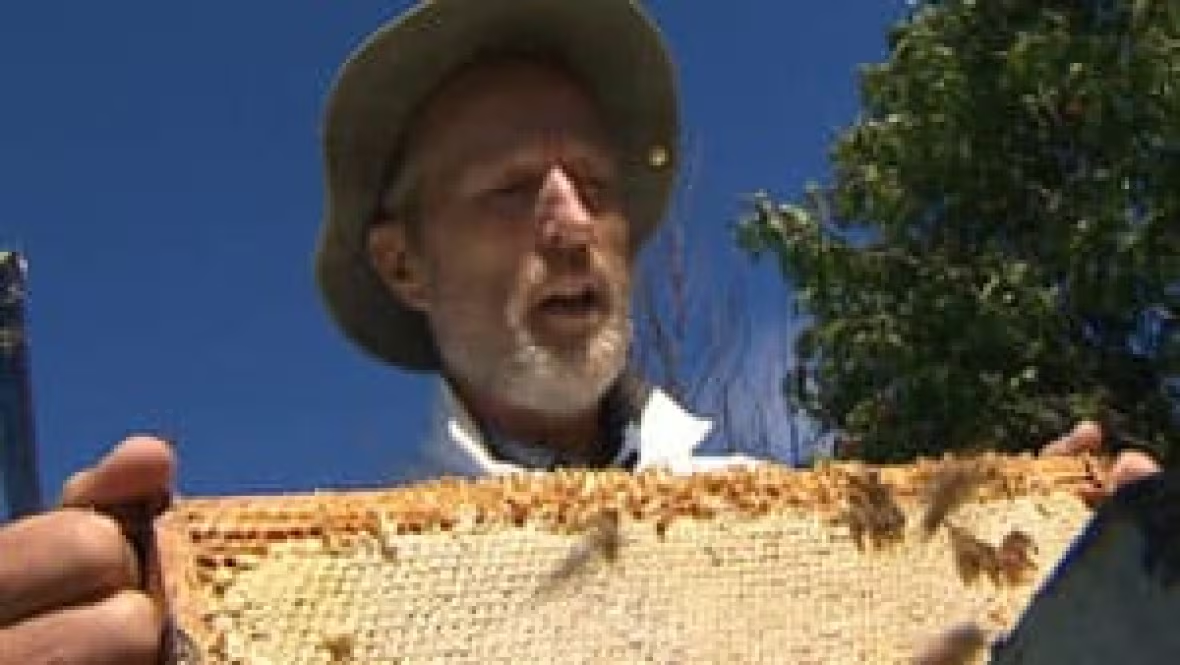Newfoundland bees drawing international scientific attention

Newfoundland's healthy honeybees are an increasing draw for researchers in the race to understand why colonies across much of the globe are struggling or dying off.
"There is definitely interest in what's happening here," said Dave Jennings, a director with the provincial Natural Resources department.
"There are fewer and fewer places as we look around the world now that can claim to be free from the major bee pests. And we're one of the few."

The Canadian Honey Council has estimated that the bee population across the country has dropped by about 35 per cent in the past three years.
The island of Newfoundland, however, is gaining attention as an increasingly rare haven.
Jennings said there are now about 38 beekeepers with hundreds of colonies. There has been growing interest in Labrador but long winters with extreme cold pose a major challenge, he explained.
Small but growing industry
It's a tiny sector compared to other places in Canada but Newfoundland produces a growing array of beeswax products. The honey is a particularly pure wildflower variety that sells out quickly to local consumers, Jennings said.
There are no recorded cases of predominant bee parasites such as Varroa destructor or Nosema ceranae that have plagued honeybees elsewhere. And the absence of massive corn and soybean farms on the rocky island with its comparatively short growing season means neonic pesticides are hardly used, Jennings said.
An international panel of 50 scientists last month called for tighter regulations and an ultimate phase-out of such products. The group calling itself the Task Force on Systemic Pesticides compared so-called neonics or neonicotinoids, a type of insecticide that's chemically reminiscent of nicotine, to the use of DDT in the 1960s.
It said a study of 800 research papers offers conclusive evidence that neonics sprayed as a preventive pesticide over crops or to coat seeds are killing bees and other insects on a massive scale.
Distance is an advantage
As for mites, Newfoundland's sheer distance from infected mainland bees means they would most likely only be introduced if imported.
"You basically can't import honeybees in this province without getting a permit," Jennings said. "We very much restrict that because we want to keep the pests out."
The province relies on the co-operation of beekeepers and is also assessing its control of bumblebee imports used to pollinate cranberry and blueberry crops, he added.
"It's something we're keeping our eye on."
Recent studies highlight how different species can pass on parasites, said Geoff Williams, a senior research associate at the Institute of Bee Health at the University of Bern in Switzerland.
"Certainly with any type of import, whether or not it's a honeybee or a bumblebee, there's the threat of this transmission of pathogens."
Handful of exceptions
Williams said Newfoundland can help researchers gauge the toll of the rampant Verroa destructor mite and other parasites elsewhere.
"There's really only a handful of locations across the globe that don't have this mite," he said. "It gives you great baseline data of what honeybee populations were like ... before Verroa."
Honeybees do visit people's lawns, clover and even dandelions. So if you can refrain from using pesticides, that'd be a great plus for the bees- Aubrey Goulding
Williams visited Newfoundland in 2010, collecting samples from hives around Corner Brook and St. John's for research that was part of an article last month in PLOS ONE, an international, peer-reviewed online scientific journal. He laughed when asked about reports that even the bees in Newfoundland are friendly.
"It depends on the day," he said. "Certainly when I was over there I didn't have any issues with really aggressive bees."
Beekeeper Aubrey Goulding and his wife, Viola, run Paradise Farms Inc., selling beeswax candles, skin balms and honey in Paradise, outside St. John's.
His bees are among the healthiest on the planet, he said. But he dreads that mites will somehow be brought to the island. He called for ongoing vigilance when it comes to bee imports and said residents can also help.
"Honeybees do visit people's lawns, clover and even dandelions. So if you can refrain from using pesticides, that'd be a great plus for the bees."